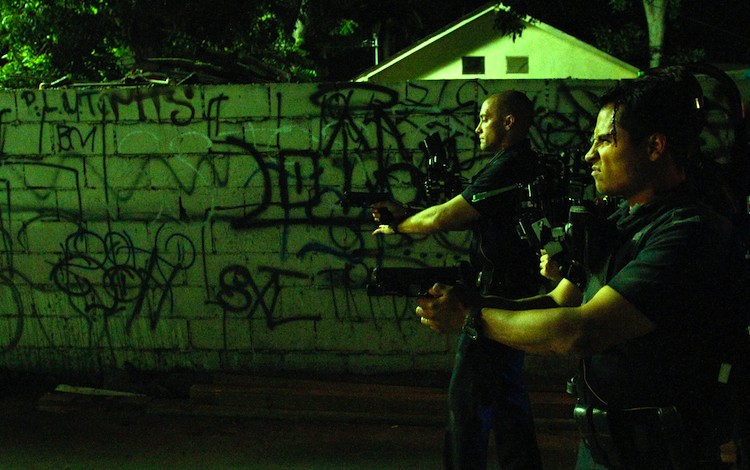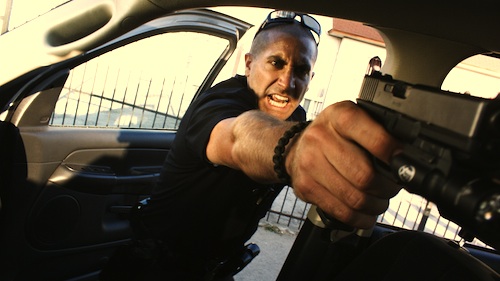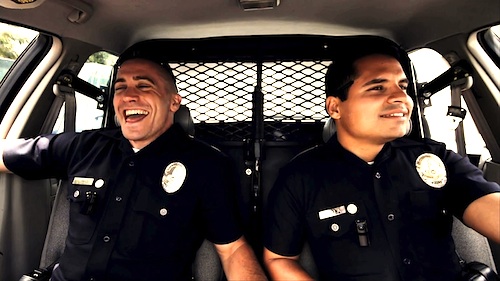
By Patricia Ducey. Southland, television’s classiest cop drama, ended its season back in March and won’t return until February 2013. That’s one year! Between seasons! Which leaves me badly in need of a cure for my LAPD blues. And so I dropped in to see End of Watch, an LAPD story written and directed by David Ayer (Training Day).
End of Watch is one part buddy drama, pairing two LAPD officers, Brian Taylor (Jake Gyllenhaal) and Mike Zavala (Michael Pena). We follow them through the mean streets of South Central Los Angeles as they banter through boredom, shoot bad guys and then stupidly and improbably conduct an extra-legal investigation of a suspicious dope peddler.
Soon they are marked for death by the Sinaloa cartel, who control the dope dealer. But the script drops in the cartel plot mostly to stitch together a series of violent vignettes into a story; the bond of affection and trust between the guys in scene after scene of cruising through L.A. is the high point of the movie. Pena is warm and funny, the tightly wound Taylor always his unwitting straight man. Some have opined that they represent a classic mismatched pair because of their different races – but this is multicultural SoCal 2012, so can we finally retire this meme? They’re just two cops who have each others’ backs and joke about everything – including race, peppered with plenty of Ayer’s trademark f-bombs.
Unfortunately, the rest of the movie doesn’t live up to their chemistry.

End of Watch is another part adrenalin-fueled action flick. It assaults all of our senses with breakneck car chases, gun battles that leave whole neighborhoods smoking; there are also beheadings, human trafficking, and even a tough-as-nails lesbian gangsta hit girl, and of course buckets of blood. But Ayer doesn’t go totally Scarface on us, and maybe he should have. He can’t mean that this is a real South Central, a neighborhood of nothing more than warring, stereotypical gangbangers – or that this is the real LAPD, a bunch of cynical rebel burnouts trying to keep the lid on their own patch of hell. He notably does ditch the PC moniker of South L.A. for the more traditional ‘South Central’ tag, and sets the main battle here as between the old African American gangs versus the Mexican newcomers, in a nod to new realities.
But if Ayer wanted an over the top comic book film, why not go all the way? Even though the action and violence is almost non-stop – in video game style – this exaggeration distances us from the narrative. So much of the action is stylistic, especially the climactic gun battle, and as a result packs little emotional wallop. End of Watch can’t decide if it’s a movie about people or of violence, and so ends up compromised on both counts.
The emphasis on violence reinforces some unsavory stereotypes, too, about both cops and South Central residents. The characters, except for Mike Zavala, present no family or neighborhood or back-story that would breathe life into them as real characters. We don’t know where they came from and we don’t much care where they are going. In this version of South Central, we meet no people except criminals.
The LAPD do not fare well, either. They are portrayed as rowdy undisciplined pranksters, starting with the first roll call scene, where they taunt the watch commander as they squirm in their seats, giggling at each other’s jokes. I almost expected spitballs to start flying. I don’t know—I think I would be listening to the watch commander about what’s happening on the street before I headed out on patrol with my life on the line.

Ayer sets up the story as Taylor and his partner clip micro-cameras to their uniforms to record their patrols. Taylor is filming their patrols for a school project. Nice cinematic device, but the movie never stays in that point of view – or any point of view. The bad guys are filming, the ICE agents are, too; sometimes nobody seems to be filming, so we are back at the traditional POV. Who, for instance, put the camera on the hood of the patrol car? Ultimately, it all just becomes irritating and confusing. We want to know what’s happening and can’t see much when we are following the micro-cameras, and we don’t know why the other cameras are filming, either. We keep waiting for a payoff to the planting of the school project film idea– like Taylor narrating the film to his classmates, who will never understand his job, for instance — but it never happens. The director just wanted the cool shots.
But I am not really Ayer’s demographic. I don’t play video games or like “gritty” movies like his previous Training Day. I feel queasy with these narratives; all they do is thrill and terrorize us with the hopeless lives of the “other” from the safety of the suburban Cineplex. So for me, End of Watch is what it is: a buddy movie with the kind of rush that might make you uncomfortable when you come back down.
I prefer the tone of Southland, where the cops are actually part of South Central – not simply its warrior overlords; where there are plenty of good people or even average people to protect and serve. I prefer the slow spooling out of a story, in the luxury of time a television season allows, to build a rich terrain of drama. Yes, I still miss Southland and it will be a long wait to February.
Posted on September 24th, 2012 at 12:33pm.
Hey Pat – thanks for the great review and the heads up on this! I’ll take a show like Southland any day over another violent movie that doesn’t care about people but only about stereotypes. I especially agree with this part of your review:
“I prefer the tone of Southland, where the cops are actually part of South Central – not simply its warrior overlords; where there are plenty of good people or even average people to protect and serve. I prefer the slow spooling out of a story, in the luxury of time a television season allows, to build a rich terrain of drama.”
I’m finding now that watching real human moments is what draws me into a story, and that as soon as it becomes all about violence or action, I become bored and tune out. You watch movies for an escape and for entertainment, and for me increasingly that means watching great characters and smart writing that involve me in another world – and that world can be anything from an immigrant LA neighborhood today to an 18th century European court to a sci-fi dystopia many millennia away. It’s all in the honesty and the intelligence of the characters and writing – that’s what makes a movie truly engaging. Thanks again for communicating your thoughts on this Pat!